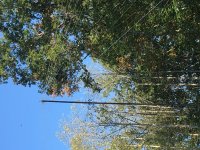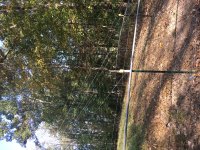Alan W.
Veteran Member
- Joined
- Apr 6, 2000
- Messages
- 1,914
- Location
- Kentucky
- Tractor
- Kubota L3650 & Bobcat 763G & Craftsman DGS6500


After losing my rooster to a red tailed hawk I decided to try and come up with a solution. Admittedly the easiest would have been lead. I needed something that would work without me being there. I remembered seeing this from someplace before. I simply drove a short piece of chainlink top rail into the ground then inserted a full length piece into it. I pop riveted a post cap to the top to tie off to. Ran white nylon twine to each post and between. Since doing this I have seen a hawk try to get the chickens twice but flare off when he got close to the twine. Fairly cheap and so far effective.